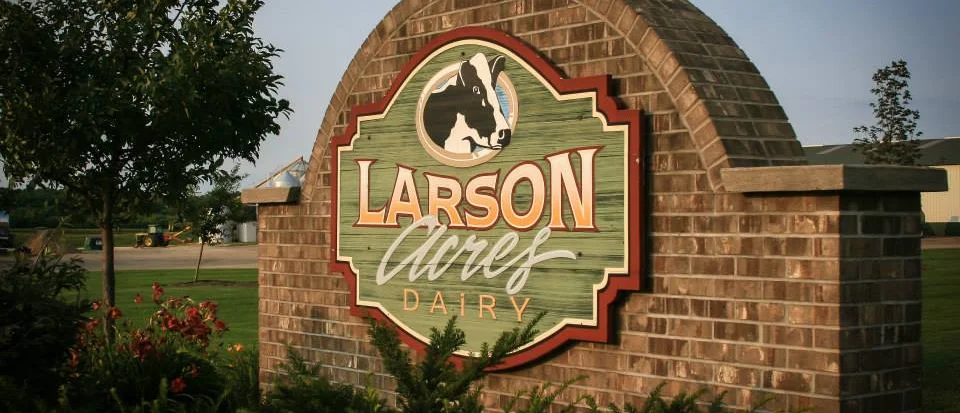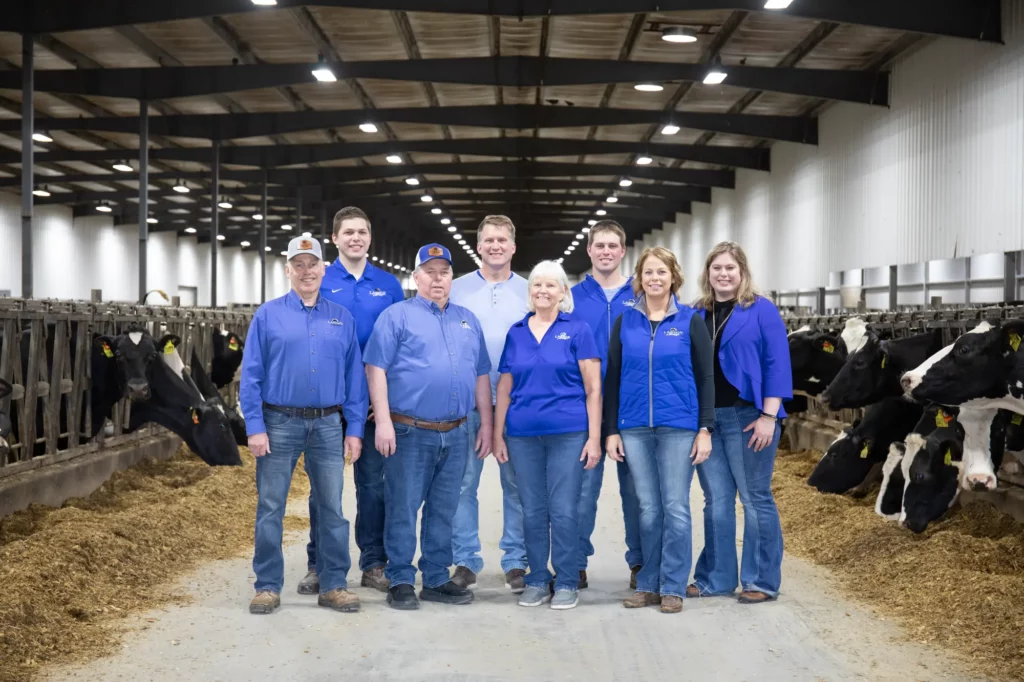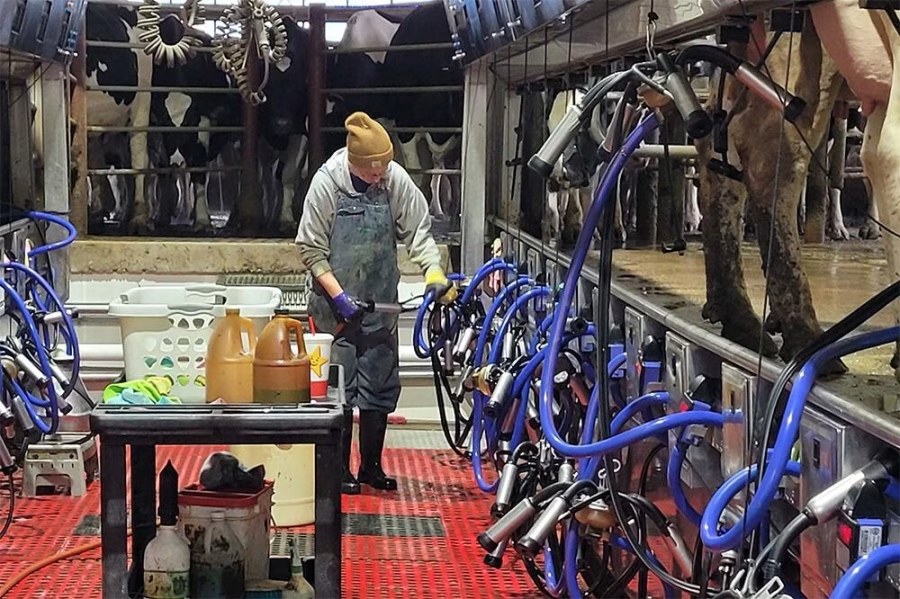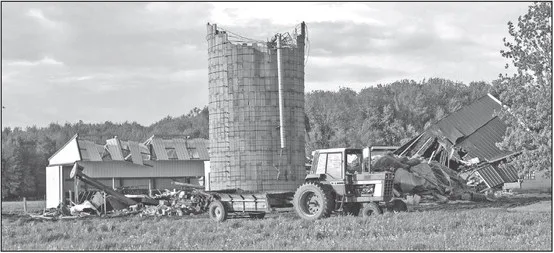Discover the inspiring journey of Larson Acres, World Dairy Expo’s 2024 Dairy Producers of the Year. How do they efficiently manage 2,500 cows and 5,000 acres?

Managing a 2,500-cow herd and 5,000 acres, Larson Acres has earned the 2024 World Dairy Expo Dairy Producers of the Year title. Meet Ed and Barb Larson, daughter Sandy, brother Mike, and Jim, Trustee from Evansville, Wisconsin, who set new standards in the dairy industry. Their story spans from modest beginnings to becoming a leading dairy operation, as shared in a recent World Dairy Expo’s Podcast – The Dairy Show The Larson Acres Team. Discover their breeding and genetics excellence, community integration, and innovative employee management—a must-read for dairy farmers aiming to thrive in today’s evolving landscape. Larson Acres showcases how tradition, innovation, and community drive success in dairy farming.
The Evolution from Humble Beginnings to Dairy Pioneers
However, this journey was not without its challenges. The farm faced economic downturns, changing market conditions, and the need to adapt to new technologies and regulations. Yet, the Larsons persevered, using these challenges as opportunities for growth and innovation. Their story is a testament to the resilience and adaptability required in the dairy industry.
The official starting point for Larson Acres, as incorporated in 1971, marked a significant leap in its transformation. However, Ed Larson’s father established the home farm in 1957, milking about 65 cows in a modest 57-stanchion barn and managing around 500 acres. This foundational setup was only the beginning of a series of pivotal developments.
One of the first significant expansions occurred in 1985, with the construction of a 155-stall tie-stall barn, a move intended to enhance cow care and streamline operations. This laid the groundwork for the farm’s first transition to a more modern setup. By 1998, the Larson family expanded by introducing their first milking parlor and free-stall barn, scaling their operations from 600 to 1,200 cows.
The 2010s were transformative years for Larson Acres, demonstrating their ambitious vision and commitment to growth. By 2010, the farm doubled its herd to approximately 2,500 milking cows, and the crop production expanded to 5,500 acres. The Larsons steadily integrated advanced techniques and technology throughout these expansions to enhance productivity and cow welfare.

Community involvement has been a key pillar of Larson Acres’ success. The farm actively participates in local events, hosts educational tours, and supports community initiatives. This not only fosters a positive relationship with the community but also helps in promoting the dairy industry and sustainable farming practices. Larson Acres’ success is not just a result of their hard work and dedication, but also the support and collaboration of the community.
The Pillars Behind Larson Acres’ Triumph
The Larson family has been pivotal in steering Larson Acres towards its current success, with each member bringing unique skills and dedication.

Ed and Barb Larson: As the founders, Ed and Barb Larson have been the cornerstone of Larson Acres. Ed’s strategic vision and relentless work ethic, coupled with Barb’s significant contributions, have been instrumental in expanding from a modest beginning to a large-scale operation. Their foresight and planning are a source of inspiration for those in the industry.
Sandy Larson: The eldest child, Sandy, has climbed the ranks to become the CEO of Larson Acres. Her deep love for cows and meticulous attention to herd health and management have been central to the farm’s high-performance levels. Sandy’s successful implementation of structured employee engagement programs not only maintains a meager turnover rate and high employee morale but also underscores the Larsons’ dedication to their team’s well-being.
Jamie Larson: Jamie, the middle child, has been integral in the technical and mechanical aspects of the farm operations. As the former shop manager, his expertise ensured the smooth functioning of the farm’s machinery and infrastructure. Although he has taken a step back from daily operations, his contributions have impacted the farm’s efficiency and maintenance practices.
Mark Larson: The youngest, Mark, although not as involved in day-to-day operations, has maintained a close connection with the farm. His architectural skills, honed outside the farm, have influenced various structural and developmental projects at Larson Acres. Mark’s pride in the family heritage brings external visibility to the farm, as he frequently hosts tours and showcases the farm’s operations to visitors.
Mike Larson: As the Dairy Manager, Mike focuses on the genetic and nutritional aspects of the operation. His work on the genetics and embryo programs has elevated the quality of the herd, leading to successful cattle exports internationally. Mike’s expertise in milk and feed pricing risk management further ensures the financial stability and growth of Larson Acres.
Jim Trustum: Serving as the Herd Manager, Jim is the linchpin in the daily management of the cows. His hands-on approach and innovative cow comfort and health strategies have significantly contributed to the herd’s high-performance metrics. His use of modern management tools like Dairy Comp and Cal Manager showcases the farm’s forward-thinking approach to maintaining elite herd health standards.
Together, these individuals form a cohesive team that epitomizes the strength of family-run businesses. Their combined efforts and diverse skill sets have propelled Larson Acres to be a leading name in the dairy industry.
Mike Larson: The Visionary Behind Larson Acres’ Genetic Excellence
Diving into the intricate realm of genetics and breeding, Mike Larson is a pivotal figure at Larson Acres. His deep-seated passion for understanding and improving herd genetics has driven the farm’s breeding initiatives to new heights. Mike’s role encompasses the meticulous management of the genetics and embryo program and the critical task of managing milk and feed pricing risk. This multifaceted responsibility ensures not just the health and productivity of the cows but also the farm’s economic resilience.
Mike’s expertise is most evident in the farm’s sophisticated breeding philosophy. Emphasizing balanced, deep-bodied animals with robust wellness traits, he selects genetic traits that promise longevity and health, steering away from a purely production-focused approach. This philosophy aligns with sustainable farming practices and underscores a commitment to animal welfare, ensuring cows reach their full potential in both productivity and well-being.
The markets for Larson Acres’ genetics extend far beyond domestic boundaries. The farm’s genetic materials and embryos are highly sought after, with a significant foothold in China and a notable presence in Japan and Germany. This international demand speaks volumes about the quality and reputation of their breeding stock. Furthermore, by participating in renowned national sales and offering some of their best animals and IVF sessions, Larson Acres showcases their willingness to share their top-tier genetics with the global farming community.
A cornerstone of Mike’s genetic program is the on-farm IVF lab, established around three years ago. This lab, a testament to the farm’s forward-thinking approach, facilitates the weekly production of embryos, ensuring consistency and quality. The partnership with Sunshine Genetics enhances this setup, allowing neighboring dairy farmers to lease the facility. This collaborative effort bolsters the local farming community and cements Larson Acres as a hub of genetic excellence.
Therefore, Mike’s role is about more than just managing genetic programs and risk strategies. It is about envisioning and steering the future of dairy farming, where genetics, technology, and sustainability converge to create a blueprint for success. Through his efforts, Larson Acres continues to lead in breeding innovations, setting benchmarks in the dairy industry worldwide.
Jim Trustum: The Custodian of Cow Welfare and Productivity at Larson Acres
Jim Trustum, as herd manager at Larson Acres, pivotally oversees the day-to-day decisions related to cow welfare and productivity. The farm boasts two separate milking barns: a conventional, naturally ventilated barn housing 1,300 cows and a cross-ventilated facility accommodating roughly 1,200 cows. Trustum’s responsibilities include ensuring that these facilities operate efficiently and effectively, contributing to the farm’s high level of productivity.
Innovations in cow comfort are a cornerstone of Larson Acres’ approach to herd management. Using recycled sand for bedding provides a comfortable and sanitary environment for the cows. At the same time, the cross-ventilated barn helps maintain a consistent and favorable climate throughout the year. The rubber flooring installation has recently enhanced hoof health, a testament to the farm’s proactive stance on animal welfare.
Technology is crucial to the farm’s success, with indispensable tools like Dairy Comp and Cal Manager. Dairy Comp assists in maintaining detailed records and making informed management decisions. At the same time, Cal Manager, with its heat and health alerts, allows for early intervention in potential health issues, ensuring the cows receive timely care.
Larson Acres’ herd statistics reflect their commitment to quality and excellence. The farm consistently achieves an average of 112 pounds of energy-corrected milk per cow daily, with a combined fat and protein percentage exceeding 7.5%. Additionally, their somatic cell count remains impressively low, at approximately 70,000, underscoring the herd’s overall health and high performance. This level of achievement is a collective effort, reliant on a dedicated team and meticulous management practices.
A Legacy of Community Engagement and Support
Larson Acres’ genuine commitment to community engagement is evident through their extensive involvement in the local fabric of Evansville and Rock County. Recognizing the importance of nurturing their home base, the farm has consistently made meaningful contributions to various community projects and events. Whether it’s funding for the Creekside community center, supporting the Evansville library’s expansion, or aiding in creating a new park on former farmland, Larson Acres ensures their legacy extends beyond dairy farming.
Beyond financial contributions, the Larson family actively participates in local events and dairy promotion activities. They are staunch supporters of the Rock County fair, assisting young 4-H members preparing to showcase their cattle. Their commitment to dairy education is further manifested in hosting numerous farm tours, providing the public with insights into modern dairy farming practices and the essential role of agriculture in their lives.
Their community engagement doesn’t stop at large-scale projects; it permeates everyday interactions within the local area. From sponsoring small contests like guessing the number of seeds in a pumpkin to organizing educational opportunities for residents, Larson Acres goes the extra mile to foster a sense of belonging and mutual support. This unwavering dedication to their community underscores the farm’s philosophy: quality, pride, and family are the pillars of their farming success and commitment to Evansville and Rock County.
Sandy Larson: Architect of Employee Well-Being and Operational Excellence at Larson Acres
At Larson Acres, Sandy Larson has demonstrated exceptional leadership and ingenuity in managing employee relations. With an authoritative yet compassionate approach, she has cultivated a work environment with high morale and remarkably low turnover, achieving a turnover rate of less than 1%. Sandy attributes this success to robust employee engagement activities, ample growth opportunities, and meticulously defined roles and Standard Operating Procedures (SOPs).
Engagement is central to Sandy’s HR strategy. She ensures regular employee interaction, organizing monthly activities such as luncheons, educational opportunities, and fun contests, like guessing the number of seeds in a pumpkin during Halloween. These activities foster community and belonging among the staff, making them feel valued and appreciated.
Furthermore, Sandy prioritizes growth opportunities for her employees. Many team members have advanced to management positions under her guidance, showcasing the farm’s commitment to professional development. This culture of internal promotion not only boosts morale but also encourages long-term loyalty and dedication, as employees see a clear path for their career progression within the farm.
Equally important are the clear role definitions and SOPs that Sandy has helped establish. Each position at Larson Acres comes with a detailed set of procedures and expectations, ensuring that employees are well-equipped to perform their duties effectively. Regular check-ins at one month and six months help to reinforce these standards, ensuring that new hires are well-integrated and confident in their roles.
This structured approach to onboarding and role clarity is complemented by frequent communication and monthly meetings, where staff can discuss ongoing projects and share insights. Sandy has created a resilient and responsive organizational structure that consistently delivers high performance and employee satisfaction by empowering middle managers with the tools and authority to lead their respective teams.
Ed Larson’s Dedication to Preserving Dairy Heritage Through His Milk Bottle Collection
Ed Larson’s passion for historical preservation finds a tangible expression in his extensive milk bottle collection, meticulously curated and showcased within Larson Acres’ museum. Housing approximately 1600 Wisconsin milk bottles, this collection is a testament to the region’s rich dairy heritage. Each bottle, organized alphabetically by Creamery, encapsulates a piece of the local dairies’ history, offering visitors a nostalgic journey through time.
The museum goes beyond milk bottles to include an array of farmer-related artifacts, soda fountain shop memorabilia, and antique agricultural equipment. Noteworthy is a diminutive stanchion from Black Earth, an evocative reminder of the craftsmanship and businesses that once defined the dairy industry. These relics, painstakingly gathered from auctions and online sources, serve as educational touchstones illuminating past dairy practices and technologies.
Significant events, such as the Evansville Historical Society’s recent fundraiser on the museum premises, underscore the community’s recognition of this heritage site. These gatherings highlight the extensive collection and foster a communal appreciation for dairy farming’s legacy. Ed’s guided tours, often featuring interactive discussions about the museum’s artifacts, engage visitors and enrich their understanding of the historical dairy landscape.
Preserving this history is crucial for future generations, ensuring they can appreciate the evolution of dairy farming and the intertwined local businesses. The museum serves as an educational platform, inspiring young farmers and community members to value their roots while innovating for the future. Through this blend of nostalgia and education, Larson Acres’ museum makes a compelling case for the importance of historical preservation in fostering community identity and continuity.
The Larson Acres Team: Blending Tradition with Progressive Vision for a Promising Future
The Larson Acres team, deeply rooted in tradition yet progressive in their approach, is setting the stage for a promising future, charting a course that involves the next generation. The farm’s leadership, exemplified by Ed, Barb, Sandy, Mike, and Jim, is committed to passing on the legacy to the younger Larsons while ensuring the operation remains at the cutting edge of dairy farming.
Sandy Larson articulates the farm’s long-term vision well. “We are setting up for the next generation,” she says, highlighting the involvement of her children Brooke, Dane, and Luke in various farm operations. With her passion for animal care, Brooke is gaining valuable experience off-farm and is expected to return, contributing to calf rearing and herd management. Dane has already embedded himself in the farm’s daily operations, working with crops and maintenance. He is integral to expanding infrastructure like commodity sheds and drying setups. Luke, a recent graduate from UW-Platteville, is honing his risk management and financial strategy skills at EverAg, positioning himself to bring these valuable insights back to Larson Acres potentially.
The farm’s goals are to sustain growth and innovation. This includes adopting new technologies to enhance productivity and cow welfare, such as advanced genetics and feeding programs spearheaded by Mike Larson. Additionally, they are focusing on implementing modern management tools and infrastructure improvements, from rubber flooring to advanced lighting systems in cow barns. These efforts aim to achieve higher efficiency, better animal health, and superior milk production metrics.
Larson Acres’ aspirations extend beyond farm efficiency. Community engagement and employee well-being remain paramount. With an incredibly low employee turnover and a structure fostering personal growth and job satisfaction, Sandy continues to drive initiatives that keep the workforce motivated and committed. This family-run farm understands its future success hinges on technological and operational advancements and nurturing a vibrant, skilled, and dedicated team.
As they prepare for continued success, the Larsons remain committed to their core values of quality, pride, and family. These principles guide their decisions and inspire the younger generation to take on more significant roles, ensuring the farm remains a leader in the dairy industry. The meticulous planning and focused goals manifest their unwavering dedication to honoring their heritage and embracing the future. The result is a robust, forward-thinking operation poised to uphold its legacy while scaling new heights in dairy excellence.
The Bottom Line
The Larson Acres team, led by Ed and Barb Larson, Mike Larson, Sandy Larson, and Jim Trustee, has earned the title of World Dairy Expo’s 2024 Dairy Producers of the Year. Managing 2,500 milking cows and 5,000 acres, their success stems from innovative breeding programs and community involvement. Mike focuses on genetics, featuring the Ferrari and Miss America cow families, while Jim ensures cow welfare. Sandy maintains a stellar workplace with minimal turnover. Beyond the farm, they support Evansville’s community and participate in dairy promotions. Embracing advanced tech and honoring heritage, Ed’s milk bottle collection is a tribute to their legacy. Visit Larson Acres or see them at the World Dairy Expo to witness their dedication and innovation in modern dairy farming.
To learn more, check out World Dairy Expo’s Podcast – The Dairy Show The Larson Acres Team.
Key Takeaways:
- Strategic Growth: From humble beginnings in 1971, Larson Acres expanded to manage a 2,500-cow milking herd and 5,000 acres, showcasing strategic and measured growth.
- Family Involvement: The farm thrives on robust family involvement, with each member contributing uniquely to its success, from genetics to operations and beyond.
- Innovative Genetics Program: Mike Larson’s focus on balanced, health-oriented animals has led to successful breeding programs and a prominent presence in international markets.
- Cow Comfort and Health: Commitment to cow welfare is evident through advanced facilities and practices, such as recycled sand bedding, cross-ventilated barns, and rubber flooring.
- Employee Engagement: Sandy Larson has fostered a positive work environment with employee engagement activities, resulting in a turnover rate of less than 1% and a waiting list for employment.
- Community Support: The Larsons actively contribute to their local community, supporting various initiatives and fostering a strong public presence.
- Historic Preservation: Ed Larson’s extensive collection of Wisconsin milk bottles and dairy artifacts offers a nostalgic glimpse into the industry’s past.
Summary:
Larson Acres, a dairy farm in Evansville, Wisconsin, has been named the 2024 World Dairy Expo Dairy Producers of the Year. The Larson family, including Ed and Barb Larson, daughter Sandy, brother Mike, and Jim Trustee, have played a significant role in the farm’s growth and success. The farm began in 1971 with 65 cows in a small barn, managing 500 acres. Over time, the family expanded their operations, introducing their first milking parlor and free-stall barn in 1985. By 2010, the farm had doubled its herd to 2,500 milking cows and crop production to 5,500 acres. The Larsons integrated advanced techniques and technology to enhance productivity and cow welfare. Community involvement is a key pillar of Larson Acres’ success, with the farm actively participating in local events, hosting educational tours, and supporting community initiatives. The farm’s breeding philosophy emphasizes balanced, deep-bodied animals with robust wellness traits, aligning with sustainable farming practices. Jim Trustum, the herd manager, oversees cow welfare and productivity decisions. Technology, such as Dairy Comp and Cal Manager, aids in managing records and decision-making.













